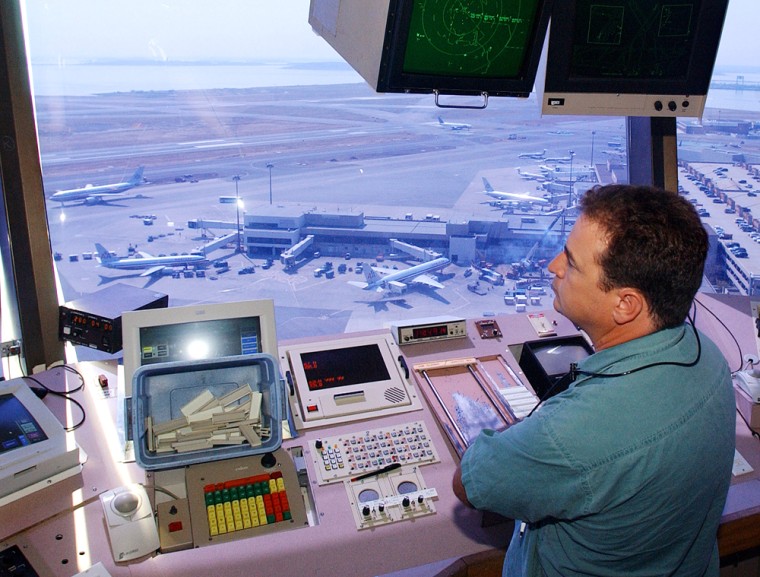Airline delays will worsen unless the government hires more air traffic controllers and pays them better, the union representing air traffic controllers said Tuesday.
The Federal Aviation Administration and the National Air Traffic Controllers Association are locked in a dispute over a new contract for the controllers. The FAA declared an impasse last year and imposed a contract.
The controllers argue that a lack of staff — as well as inadequate capacity on runways and at airport gates — are the true reason for record flight delays that have bedeviled passengers this summer.
The airline industry and the FAA, meanwhile, blame outdated technology, bad weather and increasing passenger traffic. The industry's on-time performance through July was its worst since comparable data began being collected in 1995, and the Department of Transportation is scheduled to release August data on Wednesday.
Both the airlines and the government are pressing for a new, satellite-based air traffic control system that will cost about $15 billion and take nearly 20 years to complete. Airline traffic is projected to double by 2025.
The FAA in late August awarded ITT Corp. a contract worth up to $1.8 billion to build the first portion the system. On Tuesday, the agency said it wants all planes to be equipped to use the new navigation technology by 2020.
While the FAA has conducted a "masterful PR campaign" to build support for the upgrade, known as NextGen, it won't bring any benefits for at least a decade, Patrick Forrey, the president of the air traffic controllers union, said in a conference call.
"NextGen is pie in the sky. What about Now-Gen?" Forrey quipped.
Delays and staffing shortages will continue as the union expects up to 1,300 controllers to retire this year and next, Forrey said. Although the FAA plans to add at least that many new hires to replace them, it takes at least three years for someone to be certified to handle air traffic on their own, union officials said.
Union officials said dozens of new hires in the New York area have resigned in the last two years, citing inadequate initial salaries.
But the FAA insists it has adequate staffing in New York and nationwide, and is planning for upcoming retirements, said agency spokeswoman Laura Brown. Over the past year, Brown said, the FAA has hired about 1,700 air traffic controllers and aims to increase the total number of controllers from nearly 15,000 to 16,000 by 2016.
"We're steadily ramping up the number of controllers we have out there," she said. "We've seen a phenomenal amount of interest in these jobs."
Controllers make more than $90,000 annually on average by their fifth year on the job, Brown said, noting that, "we're not finding any shortage of people who want to make that kind of money."
The FAA is planning to replace thousands of controllers, more than 70 percent of whom are eligible to retire in the next decade and have a mandatory retirement age of 56.
But union officials said it will be impossible to replace the lost experience. In the last two years, Newark Liberty International Airport in New Jersey lost six controllers with more than 100 years combined experience and replaced them with six trainees with less than two years of total experience, they said.
Most controllers were hired after President Ronald Reagan in 1981 fired more than 11,000 members of a predecessor union, the Professional Air Traffic Controllers Organization, when it refused to end an illegal strike.
AP Business Writer Alan Zibel contributed to this report.
